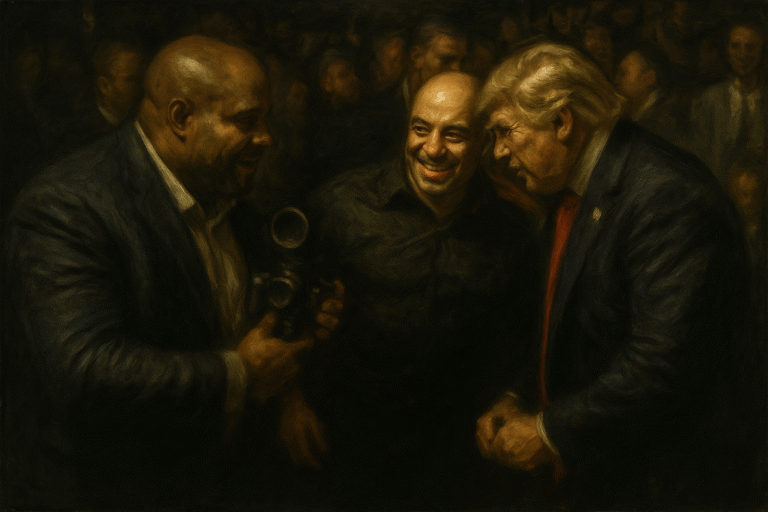003 // Joe Rogan is Just Keeping the Seat Warm

//
Joe Rogan isn’t America’s last honest man. He’s just its most reliable weather vane.
However he feels, your friend’s boyfriend probably feels the same, whether or not he admits it to her.
For over a decade, the Rogansphere—an ecosystem of supplements, pseudoscience, and Just Asking Questions™—has functioned as both the beating heart and Sauron’s eye of guys convinced they’ve unplugged from the Matrix when they’re actually mainlining it.
Rogan built his career as the everyman who ‘just asks questions.’
The tragedy is, he never learned to tell good answers from bad.
/
I | Rogan’s Appeal was Curiosity, Not Ideology
It wasn’t always this way.
Early Rogan was the guy who’d do mushrooms and debate the grassy knoll for three hours, no notes. Primitive episodes with Redban are artifacts of the podcast Big Bang—explorers charting the frontier of smoking weed, hitting record, and accidentally swinging an election.
It was anti-establishment, but not in a Jon Stewart way. His appeal was authenticity. He was the guy that could sniff out fake news, but also gave equal credence to implausible conspiracy theories that had never been legitimized outside of niche subreddits.
To understand how unrecognizable that guy is today, my first exposure to JRE was 2015, when he was fully Berniepilled—socialized healthcare, decriminalized drugs, the works. The infamous clips of him torching Trump’s border policy still resurface today.
That Rogan wouldn’t be giving Trump a victory lap—he’d be pressing him on single-payer healthcare. This was the guy who once called the idea of paying for insulin ‘the bare minimum of a functioning society.’ Now he’s debating whether climate change is real with a guy who sells protein powder.
Somewhere along the way, Rogan went from the friend who just has to show you videos from The Sphere to the uncle at Thanksgiving who suddenly has a lot of thoughts about Kamala, along with new and innovative ways to pronounce her name.
/
II | The COVID Effect & The Death of Curiosity
Whether he realized it or not, Rogan had stockpiled more attention than almost anyone in the content economy. An audience trained to think everything is bullshit—except the bullshit that flatters them. The more he leaned in, the louder the applause got. Soon, questioning the status quo wasn’t the product anymore. His audience’s paranoia was.
The pandemic didn’t necessarily change Rogan, at least not more than most. It just made his algorithmic drift impossible to ignore—and wildly profitable.
Amidst the Wuhan lab leak threads, Fauci gotchas, and proliferation of people I didn’t realize had medical degrees, two seemingly opposite groups—the paranoid libertarian-Huberman left and the Tucker-was-right right—found themselves aligned.
And in the middle? The Joe Rogan Experience™—where a J6 ‘observer’, a synthetic testosterone mogul, and a dude who swears by beef tallow skincare somehow sit down to agree that modern masculinity is in crisis.
(Might be the same guy. Unclear.)
A tragically inevitable Venn diagram: one circle convinced the government was gaslighting them, the other convinced Alex Jones shouldn’t have caved on Sandy Hook. Rogan’s podcast became the place where they realized they were on the same team.
Somewhere between “Clorox wiping your groceries is dumb” and “I did my own research on horse dewormer,” the biggest podcast in the world had quietly become its biggest echo chamber—where the only ‘open-minded’ conversation is the one that agrees with him.
Maybe this was inevitable when you give an everyman $350 million and watch what happens when the checks clear. Or maybe Bill Burr summed it up best in three minutes.
JRE in 2025 is what happens when the world’s biggest counterculture voice stops questioning power and starts mainlining his own supply. COVID was the accelerant—but the conditions were already there.
That shift didn’t happen all at once. But it happened consistently. And it happened one guest at a time
/
III | How the ‘Last Honest Man’ Turned Into the Biggest Mark in the Room
Rogan and his rogues’ gallery didn’t just get redpilled. He let the content economy turn his “fuck you money” into a direct deposit from the reactionary pipeline.
When your most-watched guests (Zuckerberg, Andreessen, Musk, Thiel) both own the platforms you rely on and bankroll the ideas you push, you’re not challenging them. You’re just keeping their seat warm.
Then, the last line of defense between the world’s largest microphone and an empty stage was the moral compass of a UFC commentator.
And now, when Elon’s 20 minutes deep into a woke mind virus rant, Rogan just murmurs ‘whoa’ and lets it ride. When Zuckerberg explains how one day ‘we won’t want to live’ without the metaverse, he sounds like an Ex Machina Letterboxd review. After building an empire as the antidote to mainstream media, the JRE now is unironically the most effective version of it.
Still, this was never just about Rogan. He may be the biggest name, but he’s also the pipeline’s fluffer—warming up the audience before the next grift takes over.
The same pipeline that took Rogan’s audience from libertarian stoners to reactionary antivaxxers is why Bradley Martyn’s podcast isn’t just about making women uncomfortable—it’s also where you’ll hear the real truth about the CDC.
Rogan didn’t set out to be a reactionary mouthpiece. But at a certain point, if you keep nodding along, you’re not exposing the system—you’re just repeating your lines.
And when your most-watched guests aren’t just grifting but own the platforms you rely on, you’re not confronting them. You work for them.
Joe Rogan built his empire calling out the system. Now, the system signs his checks. He’s not America’s last honest man—he’s just the guy at the poker table who doesn’t realize he’s the mark.
//
Related Posts

2025 DynasDee Trade Grades
A deep, no-mercy breakdown of every trade from DynasDee’s inaugural season — separating sharp process from panic moves, and identifying the deals that quietly shaped the league’s future.

2026 Fantasy Football Draft Guide & DynasDee Mock Draft 2.1
With the playoffs complete and draft order finalized, Mock Draft 2.0 reflects a tightening 2026 NFL and fantasy draft landscape. Quarterback declarations, wide receiver depth, and undervalued running backs are reshaping the board,

